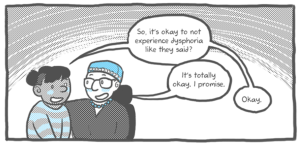
Source: Getty Images
I learned that I was academically slower to learn than most when I was in the second grade.
While others made clear that they understood what was being taught, I pretended like it made sense by shaking my head “no” when asked if I had any questions.
But when tests came back, it was clear that no matter how much I studied or tried, I just didn’t get it.
Although this was the first time that I remember feeling stupid, it wasn’t the last.
When doctors discovered that I had a learning disability, it didn’t make life – or school, for that matter – any easier for me.
Instead, what it did was make me feel worse about myself, and simply produced more head nods and smiles. I pretended like I knew so much of what I didn’t understand.
And this feeling of not being good enough, smart enough, or while at it, pretty enough when I compared myself to my friends, followed me well into adulthood.
Maybe you’ve experienced something similar.
Maybe at some point in your life, you just kind of felt somehow less than everybody else, somehow inadequate.
Well, I can tell you that you’re not alone.
Although that’s the feeling you might be experiencing, the good news is that we can change our relationship to this feeling.
Name Them
The first thing to do is to name your insecurity.
This is often difficult to do, because it’s our insecurities that we don’t want to own.
In our minds, being insecure means we are weak, so we avoid them.
But by avoiding them or pushing them down, what we are implicitly saying is that our feelings aren’t valid, that we aren’t valid.
The goal is to bring our insecurities to the front of our mind – to write them down so we can see them, to make them real.
We want to do this because it is actually our insecurities that give us an opportunity to grow.
Maybe you have a short list or maybe it’s long; either way, it’s fine.
When I first did this, I remember sitting on my couch and after writing out my list, I read it aloud.
When I got to “I’m scared I won’t be able to take care of myself,” I started to cry.
What was coming out for me was not only that some insecurities are stronger than others, but also that I had never let myself feel my insecurity before.
I had tried to cover it up, pretend it away, so to finally let myself feel the hurt and sadness that it produced was liberating.
Where Does It Come From?
With the insecurity named, now it’s time to think a bit on why you feel this way.
When was the first time you felt this insecurity. Who were you with? What were you doing? What ways does it manifest itself today? What situations do you note feeling the insecurity? Is it around certain people? What kind of people are they?
The goal of this is to ask yourself enough questions to be able to pinpoint where the insecurity comes from, and what the triggers might be in your day-to-day that affect it.
What you want to do is get to a place of understanding.
You want to get to a point where you know and acknowledge that it isn’t crazy of you to feel unloved, stupid, or not good enough – because maybe there were factors, whether intentional or not, that influenced this way of thinking.
Then you can start to see insecurity as something separate from you, like an accessory.
Only when we see our insecurity as something separate from who we are can we begin to work through and change our relationship to it.
Seeing it separately means it does not have to define who we are.
Monitor
The moment that you start to see your insecurities as separate is when you can start to monitor them.
So when you put on that dress and you look in the mirror and something inside of you tells you that you can’t wear it, you’ll know that it’s your insecurity talking to you.
When you find yourself in these situations, the best thing to do is talk back.
I’ll be about to send my resume off or pitch an article, and I’ll immediately think to myself “No, Cynthia, you don’t have the background that these other people do, what are you thinking?”
And the minute that I notice that I’m doing this, I stop and confirm that I can do this if I want to, that I may not be qualified, but that doesn’t mean I’m not good enough to try.
When you find yourself in these situations, flip the dialogue, so that you remind yourself that you are not your insecurity.
If you wear rings, for instance, whenever self-doubt creeps in, or you’re feeling insecure, try rubbing your ring and saying things like “I can do this,” “I like who I am,” or “There’s nothing wrong with me.”
If you think of the things you like about yourself and tell them to yourself in these moments, it can help to wipe away the fear that the insecurity breeds.
Seeing Differently
My cycle of insecurity looked something like feeling stupid, and then getting mad at myself for feeling stupid.
A lot of the talk that came from my insecurity was negative self-talk.
But now that you are mindful of where you feel insecure in your life and are monitoring or being mindful of when these feelings of inadequacy start, you can now shift the negative self-talk to something different.
Instead of getting down on yourself for feeling badly, think of your insecurity as an opportunity to be kinder to yourself.
Think of supporting yourself in this situation, nurturing yourself the way you would a friend who came to you and said “I feel really stupid right now because _____.”
Although nurturing yourself is a great first step, the most important part comes after – action.
The best way to circumvent negative self-talk is to take the feeling and move beyond it.
It’s easy to dwell in a negative emotion, which is why the cycle continues, but now you have an opportunity to break it.
When you find yourself dwelling in the emotion, start asking yourself questions: What can I do to make myself feel better? What could I do right now so that I don’t feel stupid? How can I make this better for myself?
What you begin to do is take responsibility for your well- being.
When you notice yourself feeling inadequate, you now have the opportunity to choose to give in or to let it go.
—
One of my favorite phrases is that we are all going through it all the time. I love what the phrase makes me feel. It’s the same feeling I have when I hear this Steve Jobs quote:
“Everything around you that you call life was made up by people that were no smarter than you, and you can change it, you can influence it, you can build your own things that other people can use.”
Feeling inadequate stems from feeling like you should be better, but you are no better or worse than anyone.
We all experience insecurity, but if we feel them and name them, then we give ourselves the chance to overcome them.
Want to discuss this further? Login to our online forum and start a post! If you’re not already registered as a forum user, please register first here.
Cynthia Kane is a Contributing Writer at Everyday Feminism. Cynthia Kane is a Contributing Writer for Everyday Feminism. Over the last year and a half, she’s relearned the following: how to jump up and down when she’s happy, cry when she’s sad, laugh when something’s funny, take a compliment, smile at strangers, and be open to the fact that everyone is going through it all the time. For more, visit her website or follow her on Twitter @cynkane. Read her articles here.
Search our 3000+ articles!
Read our articles about:
Our online racial justice training
Used by hundreds of universities, non-profits, and businesses.
Click to learn more




















